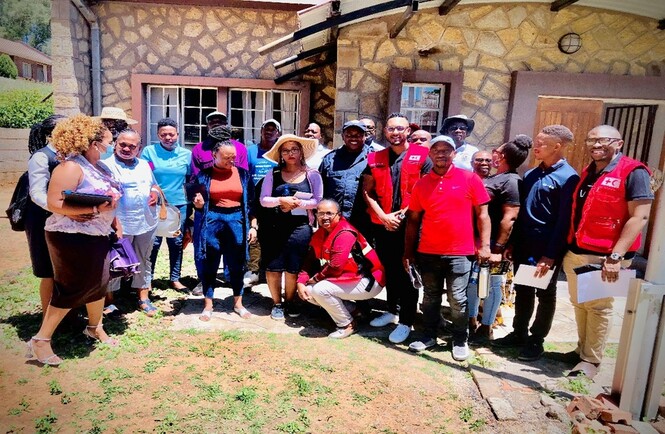
The Kingdom of Lesotho is prone to various types of disasters, including drought, heavy rainfall, flash floods, snowfall, and strong winds. To support the strengthening of preparedness and response capabilities, IFRC Disaster Law and Disaster Management teams in collaboration with the Lesotho Red Cross Society (LRCS) conducted an in-country Disaster Risk Management (DRM) Ecosystem Assessment (the Assessment) in February 2024.
Laws, plans, policies, and strategies form the foundation of DRM: they prescribe who does what, when and how, and underpin all disaster preparedness and response activities, including Early Warning Early Action initiatives. Strengthening legal preparedness is therefore crucial to building a country’s overall DRM capacity and is particularly relevant in Lesotho. However, comprehensive DRM laws and policies alone cannot ensure the effective implementation of DRM activities on the ground.
Therefore, the methodology for the Assessment included a preliminary desktop review of the relevant legal framework currently in Lesotho, followed by an in-depth on-the-ground analysis of the practical arrangements in place for disaster preparedness and response activities. A crucial aspect of the Assessment was engaging with national and district-level stakeholders involved in DRM activities and taking stock of the current strengths and gaps within the DRM ecosystem experienced in practice.
Ms. Sebongile Hlubi (Anticipatory Action/Forecast-Based Financing Project Manager) from the LRCS emphasized the organisation's commitment to the assessment, stating that,
“This assessment is very important for the National Society and arrives at a point where the LRCS is focusing on building its capacity in DRM and closing crucial gaps within the DRM Ecosystem. Furthermore, the report developed from this assessment will support LRCS in developing a Disaster Management Strategic Plan”.
The assessment included focus group discussions and interviews with LRCS representatives, as well as the National Disaster Management Authority (DMA), District Disaster Management Teams (DDMTs), Lesotho Meteorological Services, and the World Food Programme (WFP). A key focus of the assessment was to identify how legal and policy frameworks can enhance the resilience of communities that are most vulnerable to disasters and extreme weather. A starting point for this identification was prioritising field visits at the district and local community level and assessing whether these communities are not only included in legal and policy frameworks but are also included in and actively contribute to DRM activities in the country. The allocation of roles and responsibilities for local community actors is crucial to ensuring cohesive and coordinated disaster preparedness and response efforts in which all of society have roles to play. The assessment revealed that local communities are a central focus of the National Disaster Management Authority (DMA) and the DRM framework which requires, for example, the identification of communities most vulnerable to hazards in the process of DRM planning, community consultation in undertaking risk assessments, and the dissemination of disaster-related information to at-risk communities.
The assessment also canvassed early warning systems and processes: while the DMA and DRM framework provides for the development of early warning standards and encourage the issuing of these warnings in a timely and effective manner ensuring dissemination to the most vulnerable communities, prioritised inclusion and engagement of representatives in disaster-prone areas who may not have regular access to the media or internet can be improved. This approach could increase the effectiveness of early warnings for villages that are hard to access.
In conducting the assessment, the IFRC and the LRCS held a focus group discussion with the DMA in Lesotho. During this discussion, Ms. Mamonaheng Monoto (Acting CEO for DMA) stated,
“The focus group discussions were necessary for the DMA and enabled us to reflect on our DRM System. These discussions provided the opportunity to identify aspects of our DRM framework that need strengthening. As a starting point, we look forward to the support that will be provided by the Red Cross in the review of our DRM Bill of 2020”.
The IFRC is currently developing a report outlining key findings and recommendations flowing from the assessment. This report will be shared with the National Society to identify key areas where the National Society and IFRC can work together to advocate for the strengthening and enhancement of the implementation of the DRM legal and policy framework.
Sebongile Hlubi of the LRCS during the DRM Ecosystem Town Hall held on the 2nd of May 2024. Ms Hlubi stated that “as Lesotho Red Cross having an Auxiliary Role to the Government, this assessment was important because we firstly; able to gather a deeper understanding of the DRM Ecosystem in the country; secondly to be able to modernise the current legal frameworks which are currently older than 20 years and assess how best we can support the government in the development of the new DRM Bill with the current information that we have. In addition, through the assessment, we are able to decipher who are the key DRM stakeholders in the country and build strong relationships and coordination mechanisms which strengthen the support given to the government.”